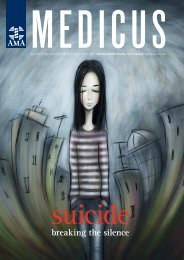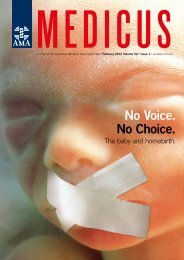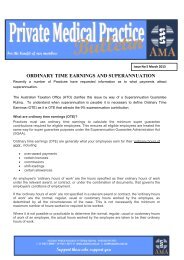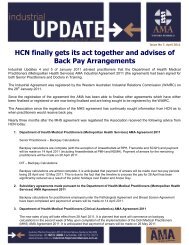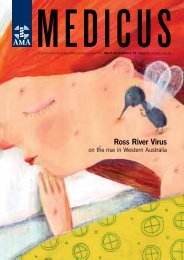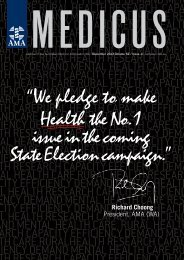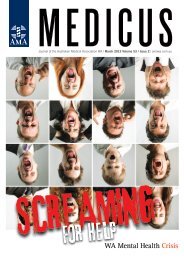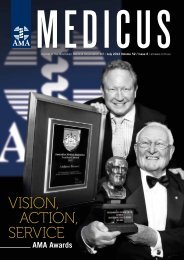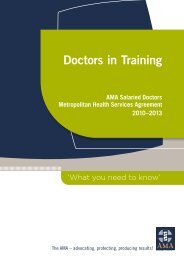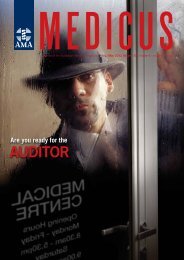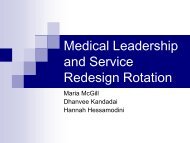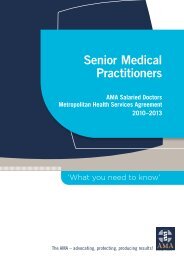twrama 1841_august_2.. - AMA WA
twrama 1841_august_2.. - AMA WA
twrama 1841_august_2.. - AMA WA
You also want an ePaper? Increase the reach of your titles
YUMPU automatically turns print PDFs into web optimized ePapers that Google loves.
FOCUS<br />
When no talk is good talk<br />
by Dr Margaret Lumley<br />
Psychiatrist, Royal Perth Hospital<br />
The recent destruction of the Mount Lawley Primary<br />
School by fire represented a tragic loss of historic<br />
buildings and an urgent need for relocation of the 400 pupils<br />
of the school. However, a subsequent plan to provide the<br />
children with ‘trauma counselling’ may prove more harmful<br />
than helpful.<br />
Clearly the aim of the planned counselling will be to help<br />
the children to avoid developing psychological or psychiatric<br />
sequelae to the event. Common sense would dictate that<br />
early intervention should be expected to help the children<br />
adjust to the loss and dislocation involved, and to stave off the<br />
development of subsequent problems such as Post-traumatic<br />
Stress Disorder (PTSD). However, this intention is misplaced.<br />
PTSD is a relatively rare condition, and is a serious<br />
and crippling psychiatric disorder. It includes painful<br />
re-experiencing of the traumatic event, during waking<br />
hours or as repetitive nightmares, withdrawal from the<br />
normal activities of life, and hypervigilance and autonomic<br />
hyperarousal in general.<br />
PTSD in children and adolescents occurs as a result of a<br />
child’s exposure to one or more traumatic events that were life<br />
threatening or perceived to be likely to cause serious injury to<br />
self or others. In addition, the child or adolescent must have<br />
responded with intense fear, helplessness or horror (Lubit<br />
2011(a)). Based on this definition alone, it is clear that, since<br />
no children were at the school at the time of the fire, they are<br />
unlikely to be affected.<br />
However, the situation is now made more complex by the<br />
planned institution of counselling. Contrary to what one might<br />
intuitively think, early trauma counselling has been shown to<br />
at best be of no benefit, but also, in a number of studies, to lead<br />
to positively deleterious outcomes (Radley et al 2011, Cartier et<br />
al 1998, Mayou 2000, Roberts et al 2009).<br />
Pausing for a moment to consider the rich tapestry of<br />
human history, it should be obvious that we are generally<br />
fairly robust in the face of a range of natural and man-made<br />
disasters. The healthy person will react to trauma in his or her<br />
own way, and move on. The initial reaction, and subsequent<br />
course of events, will be determined by a range of factors<br />
including prior experience, personality style, presence of<br />
supports, and the actual nature of the trauma and subsequent<br />
events. Any attempt to get the person to ‘deal with emotions’<br />
or ‘face facts’ or attempt to seek early closure, it seems, may<br />
interfere with a natural process and lead to a poorer outcome.<br />
Iatrogenic pathology may also be introduced by the<br />
very experience of being offered ‘therapy’. We are very<br />
psychologically suggestible, and the act of counselling<br />
itself can plant the seed that we are supposed to be having<br />
problems. Furthermore, group counselling, if employed, is<br />
subject to contagion of distress and maladaptive reactions and<br />
behaviours (Lubit 2011(b)).<br />
Ideally, then, the children of Mount Lawley Primary<br />
School should not be subjected to early ‘intervention’ of a<br />
psychological nature, particularly given that none of them<br />
are expected to have even witnessed the fire. But of course<br />
parents and teachers need to remain sensitive to the needs of<br />
the children, and, if genuine concerns arise with regard to<br />
individual students, seek appropriate help then.<br />
Dr Margaret Lumley is a psychiatrist at RPH working both in the<br />
Emergency Department and the general wards in Consultation<br />
Liaison Psychiatry. She has special interest and expertise in<br />
psychotherapy and for many years ran the highly successful<br />
CHANGES program at RPH, treating people troubled by<br />
Borderline Personality Disorder. Dr Lumley has also participated<br />
for many years on a panel of psychiatrists available to assist fellow<br />
doctors and medical students in distress.<br />
References:<br />
Bisson JI, Brayne M, Ochberg KM, Everley GS (2007), ‘Early<br />
psychosocial intervention following traumatic events’, American Journal of<br />
Psychiatry 164: 1016 – 1019.<br />
Cartier, IVE, Lamberts, RD, van Uchelen AJ, Gersons BPR (1998),<br />
‘Disaster related PTSD in police officers: a field study of the impact of<br />
debriefing’, Stress Medicine 14(3):143-8.<br />
Lubit, RH (2011(a)) ‘Posttraumatic Stress Disorder in Children’ , http://<br />
www.medscape.com/viewarticle/918844.<br />
Lubit, RH (2011(b)) ‘Acute Treatment of Disaster Survivors’, http://www.<br />
medscape.com/viewarticle/295003.<br />
Mayou, RA, Ehlers A, Hobbs M (2000) ‘Psychological debriefing in road<br />
traffic accident victims: Three year follow up of a randomized controlled<br />
trial’, British Journal of Psychiatry 176(6): 589-93.<br />
Radley JJ, Kabbaj m, Jacobsen L, Heydendael W, Yehuda R, Harman<br />
JP (2011), ‘Stress risk factors and stress related pathology: Neuroplasticity,<br />
epigenetics and endophenotypes’, Stress 14(5), 481-97.<br />
Roberts NP, Kitchener NJ, Kenardy J, Bisson JI (2009) ‘Multiple<br />
session early psychological interventions for the treatment of post<br />
traumatic stress disorder’, Cochrane Database of Systematic Reviews<br />
DOI:10.1002/14651858.CD006869.pub<strong>2.</strong><br />
August MEDICUS 17




